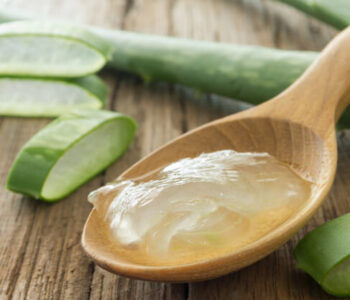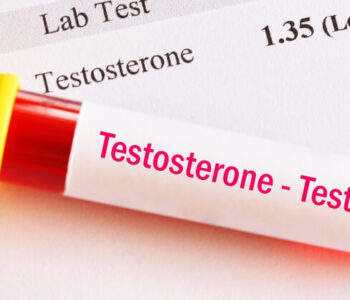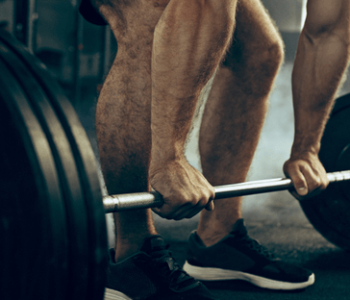In 30 seconds…
Testosterone is an androgen or male sex hormone that can decline as men get older. This can cause problems for your health and wellbeing, potentially affecting your mood, body composition, and sexual health.
How to increase testosterone? Start by exercising regularly, reducing any stress, and finding ways to improve your sleep and diet. Vitamins like vitamin D and zinc can be particularly helpful, while testosterone support supplements can help your body produce more testosterone.
Finally, there are medical solutions, including testosterone replacement therapy. This can help those experiencing low testosterone due to a specific diagnosed medical cause. For this, you’ll need to talk to your doctor.
Boosting the Male Hormone
We’re men because of our testosterone and without it, we’re not manly enough, right?
Wrong. The truth is actually far more complex. While this crucial hormone plays an important role in developing our muscle mass, male genitals, and body hair, its association with ‘manliness’ can be overstated.
So, no. Having low testosterone levels doesn’t make you less of a man. But it can reduce your overall wellbeing, affecting your sex drive, mood, and muscle growth. And these just aren’t things that any man should accept.
That’s why here we want to dig into a common question: how to increase testosterone? In this article, we’re looking at 9 ways to boost testosterone. But first…
What Does Testosterone Actually Do?
Testosterone is a male sex hormone that gets busy helping you to develop physically from a very young age. As early as seven weeks after conception, testosterone is helping your body develop your genitals. And from that point on, it’s constantly working to turn you into an adult body.
Hormones are essentially substances that send chemical messages around your body. While testosterone is famously produced in the testes, it’s actually part of a big chain of hormonal messages that start from your brain and pituitary gland and pass through your adrenal glands. That’s why women have testosterone too (yes, it’s true!), even if they don’t have testes.
After you’ve developed in the womb, then, testosterone affects four main aspects of men’s health:
- Puberty: At this time, your voice is deepening, you’re growing facial and body hair, you have an increasing sexual appetite, and your shoulders are broadening. Testosterone is behind all of this.
- Body composition: The amount of body fat and muscle you have is controlled and regulated by testosterone.
- Sexual health: Your sex drive, erectile function, and sperm count are all controlled by your levels of testosterone. Infertility is a risk associated with low T.
- Mood: Testosterone is thought to affect your mood, your sleep, and your energy levels.
So, testosterone is about muscles and sex drives? Yes. But all that stuff about aggression and fast cars? Not so much. Again, maintaining testosterone production is about your health – not your ‘masculinity’.
Low Testosterone: How to Recognise It
Low testosterone is a condition that can affect men of any age – but it’s most commonly associated with older men. The peak of testosterone production happens through the ages of 19 to 30. After this age, testosterone decreases naturally by about 1% every year. That means older men naturally have lower testosterone levels.
In some men, this can cause health problems, due to a condition known as low testosterone, or low T (it’s sometimes also known as hypogonadism). Often, symptoms can be confused with the effects of ageing. However, the main symptoms include:
- Erectile dysfunction
- Reduced sex drive and sexual function
- Increased body fat and loss of muscle mass
- Feelings of fatigue, depression, and sometimes anger
- Loss of body hair
- Enlargement of breasts
Often, low T is caused by the natural decline of testosterone levels. However, your hormone levels can be affected by something more serious, such as:
- Prostate cancer or testicular cancer, and chemotherapy
- Damage to your testes
- Problems with your pituitary gland or your adrenal gland
- Chronic diseases such as diabetes or HIV
- Obesity
- Alcohol abuse
Whatever the reason behind it, if you feel like you’re experiencing low T, take a testosterone test to check your levels. It’s easy and you can do it home. Get started here.
How to Increase Testosterone: 9 Tips
Now’s time for some practicable ways to increase testosterone levels. We’re focusing on lifestyle changes and natural supplements that are proven to be effective.
Healthy Lifestyle Changes to Boost Testosterone Levels
- Improve your sleep. Most of your testosterone is produced and released during sleep. And studies have found that those who sleep less have lower testosterone. Aim for 7 to 9 hours of sleep a night. We know this can be difficult, as low T can make quality sleep harder to achieve. But exercise and a healthy diet can make a good night’s sleep easier.
- Exercise regularly – including weight training. Exercise and testosterone levels have been repeatedly linked in studies, including in studies on older men. 150 minutes of moderate-intensity exercise a week is recommended, but studies suggest weight training is better than cardiovascular workouts.
Find out more: Testosterone-Boosting Exercises.
- Reduce stress. Easier said than done, we know, but cortisol – a stress hormone we release when stressed – is a natural suppresser of testosterone. Finding ways to unwind, like meditation, exercise, or just doing something you love, can make things easier.
- Aim for a healthy diet. Men who are obese are more likely to suffer from low T, while those who eat lots of hydrogenated fats may experience impaired testicular function. Reducing processed foods and eating a wider diet is important here.
Learn more: Testosterone-Boosting Foods to Add to Your Diet - Reduce alcohol consumption. Drinking lots of alcohol may inhibit testosterone production. Try to keep alcohol to a healthy level.
Certain medications can also lower testosterone levels. For example, antipsychotics and opioids have been shown to do this. Depending on your situation, these types of prescribed medications may be necessary for your health and wellbeing, so it wouldn’t be wise to cut them out in order to boost your testosterone. If in doubt, speak to your doctor.
Vitamins and Supplements for Increased Testosterone
Your body is a complex system of interactions between chemicals, substances, and the things you eat. Some vitamins are crucial for testosterone production. Here are the ones you should make sure you get enough of:
- Vitamin D. Many of us are deficient in vitamin D, the so-called ‘sunshine vitamin’. But this is not just a problem for your overall health. Vitamin D and testosterone are closely connected. According to one study, daily doses of vitamin D can increase your testosterone by 25%.
- Magnesium. It plays a role in over 300 different enzyme systems, regulating all sorts of different processes in your body. One of those is testosterone production. Studies have found that magnesium supplements increase testosterone – and the results are particularly dramatic in active men.
- Zinc. Zinc deficiency is a common deficiency that is associated with low T. Studies have shown that zinc supplementation can increase testosterone production.
- Maca and ginseng. Extracts from the ginseng and maca plants can help to reduce symptoms of low T. While ginseng has been found to possibly boost testosterone production, there’s pretty strong evidence to suggest that maca can boost sperm health and increase libido. Find out more about maca here.
Visit our Daily Health page for information on all the supplements you need.
Testosterone Replacement Therapy
A final method to boost your testosterone levels exists. That’s testosterone replacement therapy or TRT. This involves taking supplementation of testosterone directly, either through tablets, patches, injections, or gels.
This will not be for everyone. However, if your low T symptoms are serious – or your low T is the result of previous illnesses, injuries, or medications – this could help you.

Keep those T levels up
The powerful threesome of Maca, Ginseng & Zinc is there to help you boost testosterone levels and, in turn, virility. Low T can be a libido killer.
Key Takeaways
How to increase testosterone? Your starting point is to change your lifestyle. Exercise, try to improve your sleep, and try to eat a varied and healthy diet. Vitamins and supplements, including vitamin D, zinc, and maca, can help too.It can help to get a sense of your testosterone levels before you do anything. Take a testosterone test today. It’s easy – and you can have it delivered to your home.












